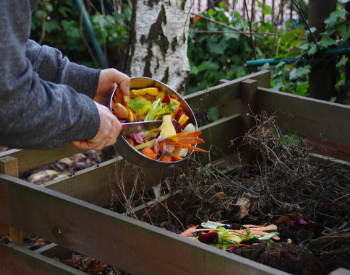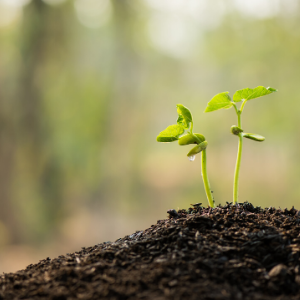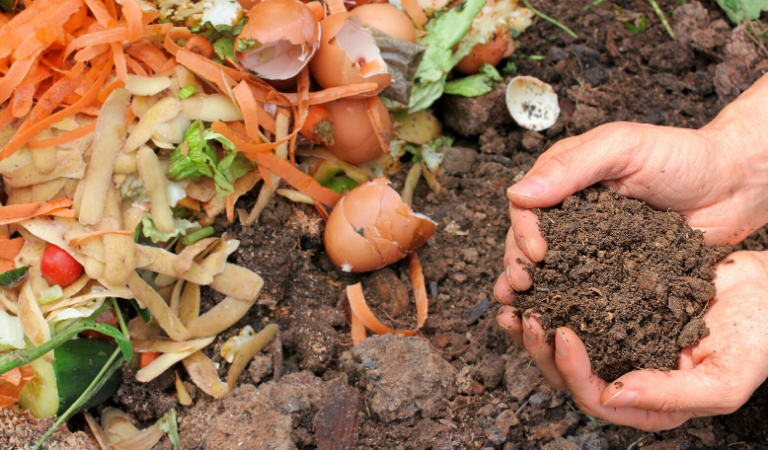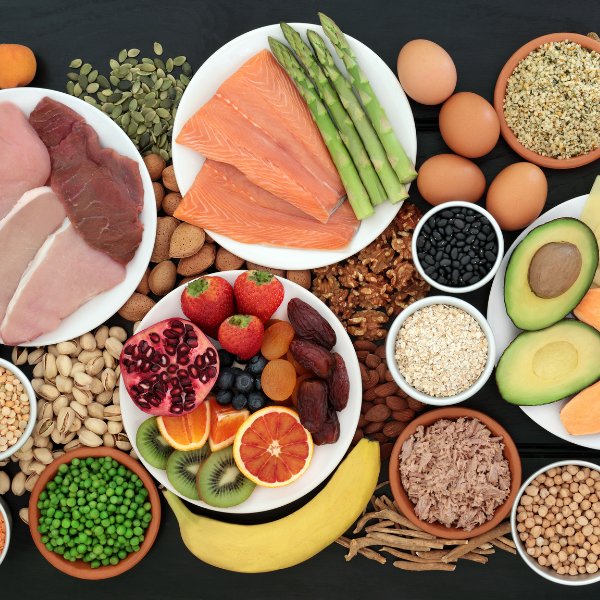Trying to find ways for your foodservice establishment to become more environmentally-friendly? Consider composting your organic waste. Food waste negatively affects the environment due to the amount of methane it produces when disposed into landfills. By composting, you can use food waste to enrich the soil and reduce your carbon footprint. In this detailed guide, you’ll learn about the benefits of composting and how to compost in your establishment.
What Is Composting?
Composting is a natural process that decomposes organic waste using nitrogen, carbon, moisture, and oxygen. This process turns the organic waste into a dark, rich substance that is known as humus or compost. Humus can be used on all kinds of soils to provide the proper nutrients for plants and help them grow quickly.
What Are The Benefits of Composting?
More and more restaurants nationwide are beginning to compost organic waste. Below are the financial and environmental benefits of composting in your foodservice establishment.
Reduces Waste In Your Establishment
By composting in your restaurant, you are able to minimize the amount of food waste that reaches landfills. Waste in landfills rots and produces methane emissions which is a major contributor to climate change. Composting also reduces the number of trash pickups businesses need which lowers their waste removal bill.
Enriches The Soil
Composting turns the waste in your restaurant into nutrient-rich humus that can be used to fertilize crops and improve the fertility of poor soil. The compost helps soil hold onto nutrients and water which helps your crops fully grow. The fruits and vegetables that you grow can be used to prepare meals and help cut food costs.
Eliminates The Need For Chemical Fertilizers
Chemical fertilizers are extremely high in nitrogen which damages plants and reduces crop yield. The chemicals can also lead to soil acidification because of the lack of organic matter in the soil. By composting, you’ll be able to use humus to grow healthy crops and eliminate the need to purchase expensive fertilizer.
What Can I Not Compost?
When deciding on what to compost, it’s important to leave out diseased plants and troublesome weeds because it’s difficult for them to fully breakdown. It’s also ideal to prevent waste that attracts raccoons, rodents, and other pests. Here is a list of some of the other items that shouldn’t be composted in your restaurant:
- Dairy products
- Meats
- Fish
- Bones
- Coal and charcoal ashes
- Oils, fats, lards, and greases
What Can I Compost?
The majority of food scraps, paper products, and other waste that was once alive can be composted. However, due to the limited amount of space and equipment you may have in your establishment, it’s best to be selective on what you compost. Below is a list of waste that you may find in your business that can be easily composted:
Browns:
- Wood chips
- Leaves Yard trimmings
- Twigs and straw
- Newspapers
- Cardboards
Greens:
- Fruits and vegetables
- Grass clippings
- Coffee grounds and filters
- Eggshells
- Nutshells
- Tea bags
The brown waste provides carbon and the green matter supplies nitrogen to your compost. Having a mix of nitrogen and carbon in your compost is essential in order for the composting process to work.

Do I Need A Compost Bin?
Compost can be produced by either using bins or open piles. However, composting bins help keep fruits, coffee grounds, grass clippings, and other waste neatly organized in one location. Many compost containers are also designed to provide proper airflow and moisture to transform the organic materials into compost. When deciding on which compost bin is right for your business, ask yourself the following questions:
- Is this the right size for my restaurant’s needs?
- Does the container allow me to easily mix items?
- Is the bin easy to load and unload?
- Does this bin allow oxygen to circulate amongst materials?
How Can I Compost In My Restaurant?
Composting in your restaurant provides you with full control of what goes into your compost bin and where the compost goes once the process is completed. However, before you begin to compost at your business, it’s essential that you check composting regulations. There may be local or state guidelines that prohibit or regulate on-site composting in your area.
Furthermore, it’s important for restaurants to use the proper technique when composting so organic materials can quickly and effectively decompose. Below is a step-by-step process on how to compost in your business:
- Find a location for your compost container. The bin should be in a dry, shady area that is near a water source and easily accessible to employees.
- Add some soil to your compost bin. The soil adds bacteria which allows organic waste to quickly compost.
- Include a layer of brown materials. If you have large pieces of leaves, newspapers, or twigs, shred or chop them into smaller pieces so they can easily decay.
- Add a layer of green materials. Ensure that fruits, vegetables, eggshells, and other green waste are cut into small pieces.
- Continue to add green and brown waste. Add layers of green and brown waste until you no longer have organic materials. You may also add soil in between layers to speed up the composting process.
- Keep your compost moist. Occasionally water your compost to guarantee that it’s moist. The moisture helps break down the organic matter.
- Mix the compost. Turn the compost once a week to provide it with the necessary oxygen it needs to decompose. When mixing, check for proper moisture and move coarse materials from the outside to the center. Add water if necessary.
- The composting process is complete! The process can take anywhere from a couple of months to a year. You will know the compost is ready for use when it’s dark and rich in color and has a crumbly texture.
What If I Don’t Have An Area To Compost?
There are a number of foodservice establishments that don’t have enough space to compost food waste on-site. However, restaurants can still compost organic materials through haul away services. Many waste management companies have compost trucks and there are also compost facilities nationwide. Simply contact each business in your area to understand their composting process and see which company is right for you.
When composting with a haul away service, it’s important to separate garbage from the organic waste that you’d like to be composted. You can do this by designating a container for collecting organic materials and labeling it so employees can easily identify the bin.
It’s Time To Compost!
Now that you understand the financial and environmental benefits of composting, it’s time to get started. Determine if it’s best for your business to compost in the facility or through a haul away service. Once you’ve decided, simply collect organic waste throughout the day and follow our guide to properly compost at your establishment.








